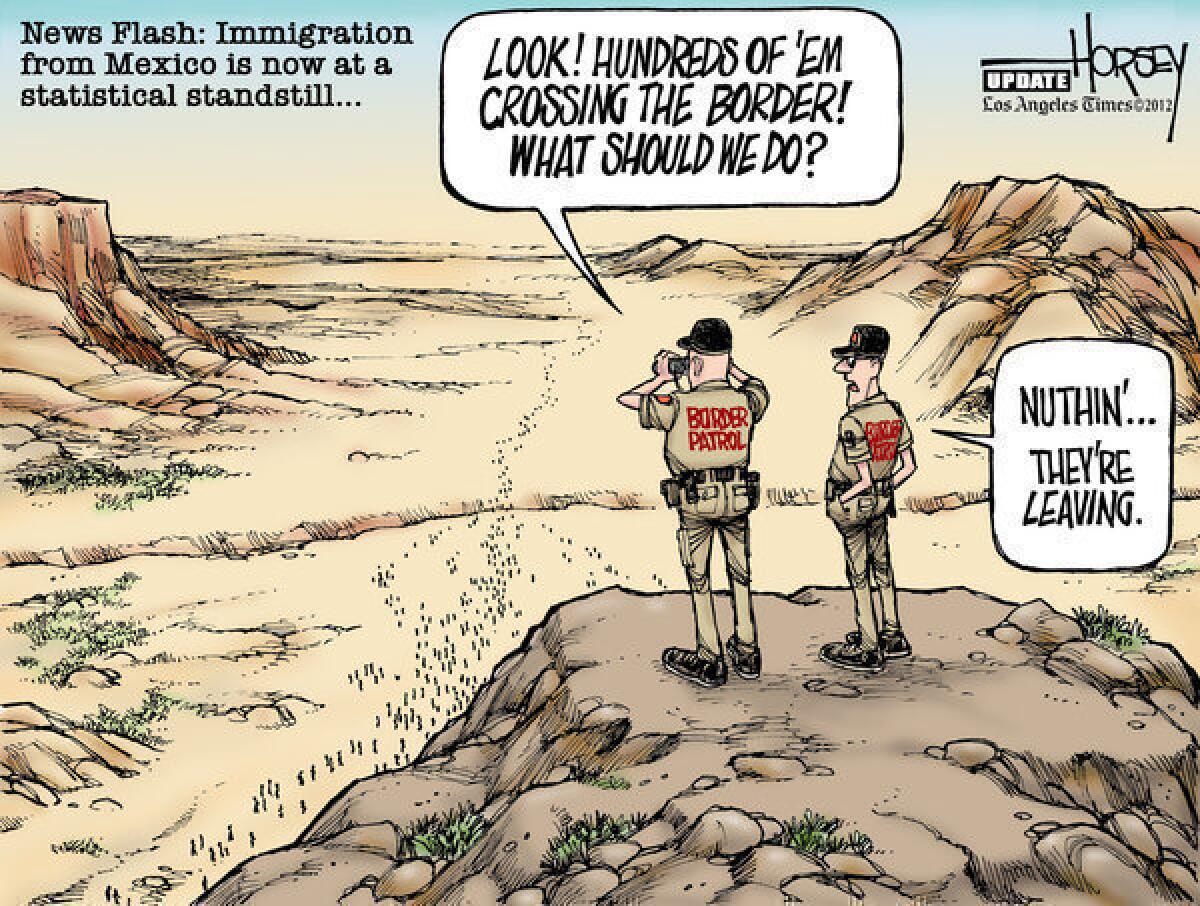However Supreme Court rules on immigration, numbers favor Obama

Just as the U.S. Supreme Court begins to hear arguments about Arizona’s hard-line immigration law, a study pops up that says illegal immigration from Mexico is a diminishing problem.
According to a report released by the Pew Hispanic Center, the massive wave of Mexicans entering this country illegally is subsiding and a rising counter current of Mexicans returning to their homeland has brought net migration to a statistical equilibrium.
This trend began about five years ago, according to the report, and the number of undocumented Mexican nationals in the U.S. has fallen from 7 million to 6.1 million. At the same time, the number returning – or, as Mitt Romney would put it, “self-deporting” – has jumped significantly.
One big factor in this is something demographers have anticipated for years.
Starting in the 1970s, birth control became much more widely available in Mexico. Where once Mexicans had one of the world’s highest birthrates, that rate has dropped to a level almost on par with the United States. As a result, the cohort of young Mexicans who might want to head north for work has grown smaller.
Another big element in the immigration shift is that Mexico’s economy is puttering along rather well. There are more jobs south of the border, while the prolonged U.S. economic slump has made employment scarcer to the north. The result is that, for some Mexicans, there is more economic opportunity to be found at home than in places such as Arizona, where they are less and less welcome.
Adding to the incentive for Mexicans to stay put are the heightened dangers along the border, beefed-up border enforcement and a sharp increase in deportations under the Obama administration. (A record high 400,000 people were deported last year alone.)
All of this does not make the case before the Supreme Court superfluous, but it may alter the political climate in which the ruling will be made.
Arizona and several other states argue that they need to be able to conduct their own crackdowns on illegal immigration because the feds under President Obama’s leadership have failed to do the job. Theirs is a states-rights argument. Obama administration lawyers will insist this is a usurpation of the federal responsibility to set immigration policy. They argue that targeted enforcement, not random stops of Latinos to ask for their identification papers, is the best approach to the challenge.
Now, they may also be able to argue that what they are doing is working and no aggressive targeting of suspected border-jumpers by local police is necessary. Nevertheless, Obama’s attorneys will be fighting the usual uphill battle against the court’s conservative majority. Those five justices have already upheld another Arizona statute that revokes the business license of any employer who knowingly hires illegals. When their ruling comes down in June, it will not be surprising if they also decide in favor of the states’ right to round up suspicious characters with brown skin and Spanish surnames and demand to see their papers.
Just as will be the case if the Supreme Court strikes down all or part of “Obamacare,” a court decision against the administration in the Arizona dispute will land the issue squarely in the center of the presidential election debate. Romney has declared himself a fan of the Arizona laws and an enemy of any Dream Act-like legislation that would provide a path to citizenship for young people who have grown up on this side of the border illegally. His tough stance may have boosted his conservative credentials in the Republican primaries, but it is losing him thousands of votes among Hispanic Americans.
As this plays out in the campaign, Obama will have numbers on his side: high poll numbers among Hispanic voters, the high number of deportations his administration has done and, now, the numbers showing that illegal immigration may be a problem that is slowly but steadily going south.
More to Read
Get the L.A. Times Politics newsletter
Deeply reported insights into legislation, politics and policy from Sacramento, Washington and beyond. In your inbox three times per week.
You may occasionally receive promotional content from the Los Angeles Times.











